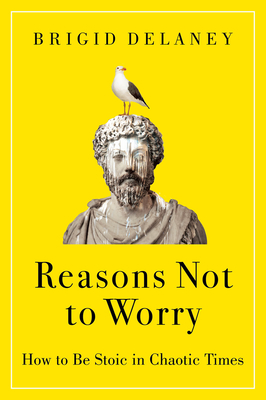Psychologist and professional grandfather Dr Bob Rich offered this advice to people suffering from climate anxiety: “Do the best you can, then don’t worry”. His advice follows the rich tradition of stoic philosophy.
The word stoic in modern usage has devolved to describe people who bottle up their emotions. This interpretation fails to acknowledge Stoicism’s core underpinning: by recognizing that we live in an uncertain world we can avoid much unnecessary anxiety and grief.
Brigid Delaney’s book Reasons Not to Worry is an informative account of stoic philosophy, following her own journey in embracing Stoicism and how it affected her life.
Stoicism originated in classical Greek and Roman times. The best known Stoic philosophers were Seneca, Epictetus and Roman emperor Marcus Aurelius, whose journal, published as Meditations, is still highly rated. Stoicism is best known today though the quotes of these philosophers, but when taken individually they can miss the point.
So in this post I will try to summarize Stoicism with the help of Delaney’s book.
The first step in understanding Stoicism is to acknowledge how little we individually control. We can only fully control just three things:
- Our character
- Our reactions and actions
- How we treat others.
We cannot fully control how other people behave or react, or what they think of us. Social change is not within our direct control either although we can try to influence but with no surety of outcome.
There are gray areas where it is hard to apply this ‘control test’ but an honest appraisal will find that we have less control than we imagine. Recognizing and accepting that we cannot control matters external to ourselves immediately relieves us of a huge burden of potential anxieties.
The more we value things outside our control, the less control we have.
Epictetus
Worrying is like paying a debt you don’t owe.
Mark Twain
Stoics believed that character, virtue and rational thinking were things we should nurture and protect as they are within our control. Which brings us to the doctrine of ‘preferred indifferents’.
Stoics classified a range of things including wealth, health and reputation as a ‘preferred indifferent’ – meaning it’s preferable to have them but, as they are not fully in our control, we should be indifferent as to whether we have them, lost them or never had them in the first place. The reason in part is to suffer less and not to be injured twice. The first injury is the loss or failure to gain the indifferent. The second, often worse, is the anguish we put ourselves through as emotions such as anger, bitterness or revenge come to the fore.
if you are distressed by anything external, the pain is not due to the thing itself but to your estimate of it – and this you have the power to revoke at any moment.
Marcus Aurelius
There is nothing either good or bad, but thinking makes it so.
Shakespeare’s Hamlet
The Stoics consider everything we have, including our health, as not our own but simply on loan, that one day will be taken back. So when it is taken we should not be surprised, we should not be bitter and our tranquillity should not be disturbed.
This is easy to say but hard to do. Which is why the Stoics recommend testing yourself with occasional hardships such as fasting, deprivation of pleasures, and even brief thoughts about you or your loved ones falling sick or even dying. These act like an inoculations against the feelings that arise when the real event occurs.
One of the consequences of following stoic philosophy is a greater balance and tranquillity in your life. That means that the downs are moderated but so are the ups.
This all leads us to be grateful for what we have and for every day of life. The Stoics saw time as the only true currency we have. We cannot borrow more time or create more time. If you see time as the most valuable thing you have, you may change how you view and organize your life.
Begin at once to live, and count each separate day as a separate life
Seneca
Brigid Delaney’s book explores Stoicism in some depth from a personal perspective. The book’s chapters include how to work out what matters, cope with disaster, beat anxiety, how to grieve, and how to be mortal. This is all fashioned by Delaney’s own personal journey into Stoicism which, she says, she is still using every day.
As an approachable introduction to Stoicism I highly recommend Reasons Not to Worry.
The writer is the co-author of Court of the Grandchildren, a novel set in 2050s America.
For more posts on this theme:
How to Cope with Climate Anxiety
The Best Thing You Can Do to Tackle Global Warming
How to Talk about Climate Change
